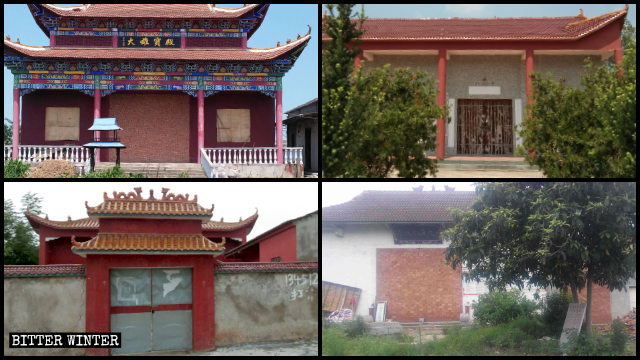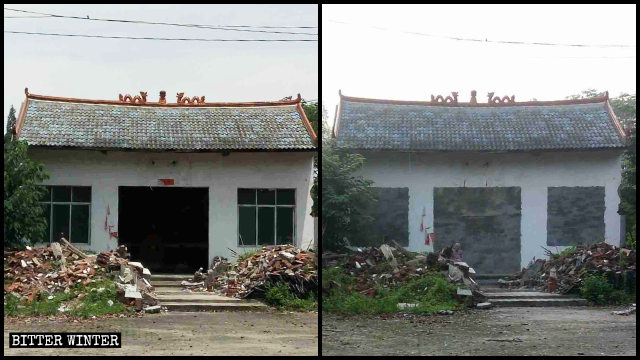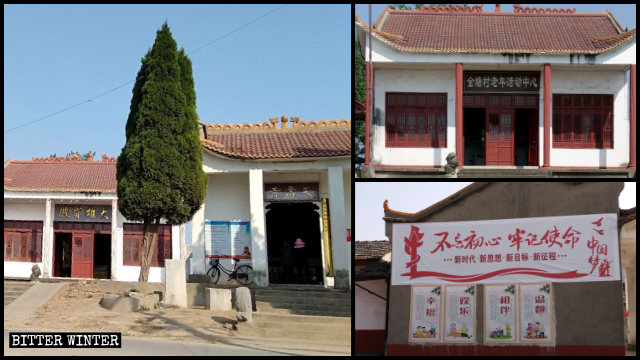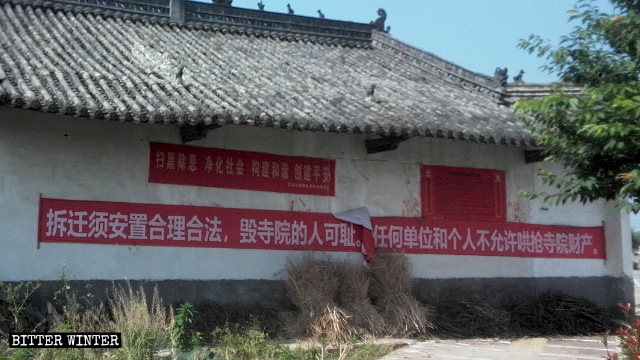The CCP demands worship places to get religious activity venue registration certificates but denies almost all requests, creating a “legal” basis for persecution.
by Zhou Xiaolu
The new Regulations on Religious Affairs that came into force in February 2018 foresee that no place of worship can operate without a Bureau-issued religious activity venue registration certificate. Though state-approved but without a permit, many churches or temples were allowed to exist before the new law was enforced. With the intensifying suppression of all things religious, however, the government uses the permit’s absence to close down or even demolish religious venues.
“Many temples in our city don’t have religious activity venue registration certificates,” explained a Buddhist from the prefecture-level city of Hanzhong in the northwestern province of Shaanxi. “They can be closed down, and monks be driven away at any time.”
An ancient Buddhist temple in Hanzhong’s Chenggu county also doesn’t have the certificate. “Temples without the permit may even be demolished,” a monk from the temple told Bitter Winter. He complained that he could do nothing but pray to Buddha to preserve the temple because the permit was denied every time its director applied.
There are abundant similar cases across China. While demanding each place of worship to have a certificate, authorities usually deny their applications without providing any reasons and later justify crackdowns and bans on them because venues “are unlicensed.”
Another ancient Buddhist temple in Chenggu county faces a similar plight. Originally built in the Tang dynasty (618-907), the temple started applying for a certificate as early as 2010, but to no avail. Its 80-year-old abbot still hopes the temple will get the certificate in his lifetime so that other monks could continue spreading Buddhism in the temple. Though saddened by the situation, the abbot doesn’t give up and continues fighting for the permit.
“The growing number of temples and Buddhists threatens the atheist Communist Party,” another monk from Chenggu believes. “That is why the government denies religious activity venue registration certificates and prohibits to build new temples.”
Buddhist, Taoist, and folk religion temples in the central province of Hubei are also heavily suppressed on the pretext of “being unlicensed.”

The Buddhist Yongzhenshan Temple, spanning the history of over three centuries in Qinggang village, administered by Hongcheng township in the county-level city of Jianli, was closed down in June.
The same month, the same fate befell the city’s Taoist Shanqing Temple, built in the Ming dynasty (1368-1644), and the Buddhist Luodu Temple, established 400 years ago.

“The central government demands to demolish all temples without certificates,” a Jianli government employee revealed to Bitter Winter. “Temples can only be saved from demolition if their managers agree to close them.”
“We do nothing illegal in the temple, just worship and meditate, so why does the government persecute us so much?” a temple manager from Jianli asked.
In August, the Buddhist Tianshou Temple in Jianli-administered Qipan township was converted into an elderly activity center because it didn’t have the registration certificate. The building was covered with Party propaganda slogans, such as “Don’t forget the original intention; keep the mission in mind,” “New thoughts, new goals, new eras, new journeys,” and alike.

Even the possession of a religious activity venue registration certificate doesn’t save places of worship from persecution.
The Buddhist Jinlong Temple in Shaanxi Province was demolished in June, although it had a valid certificate. Local authorities repurposed the land on which it was built, promising to find a place to construct a new temple. Instead, the congregation was merged with another temple, and the Jinlong Temple ceased to exist.

Source: Bitter Winter












